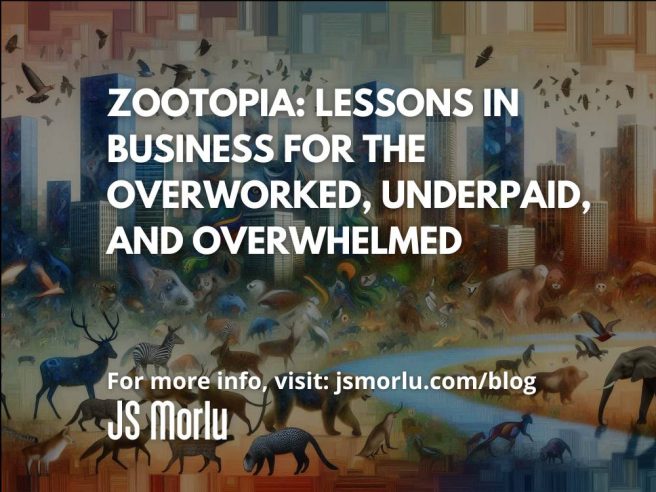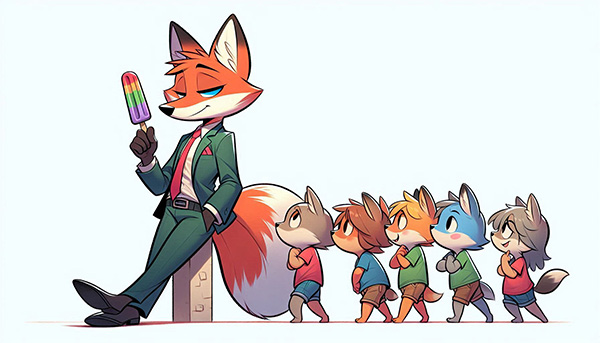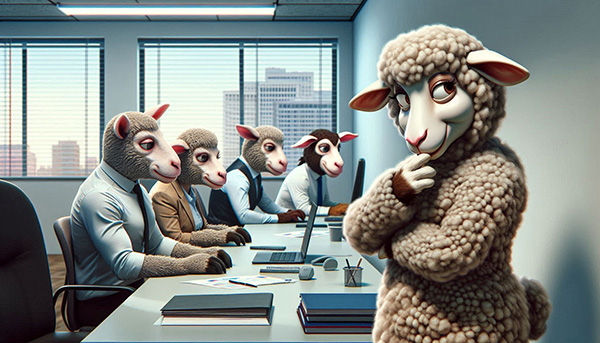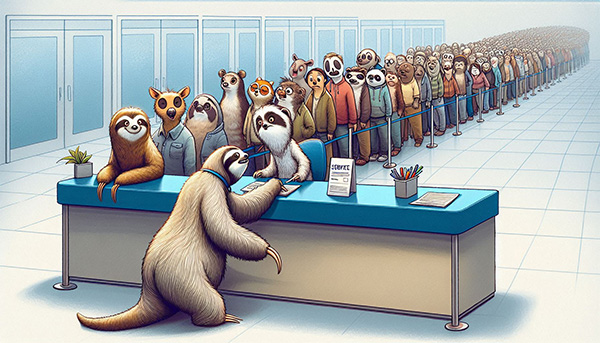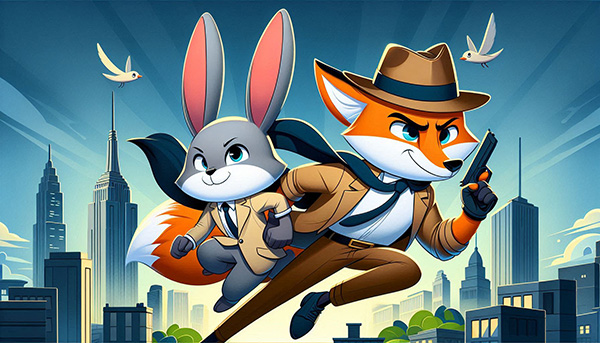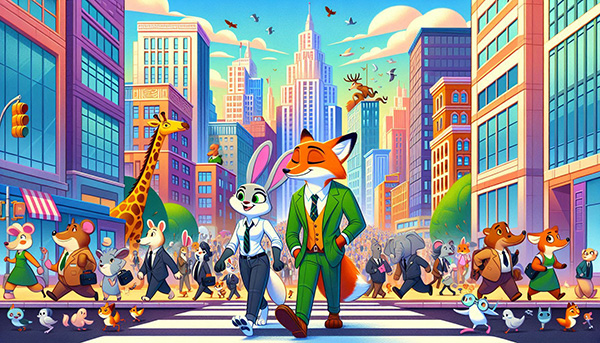By: John S. Morlu II, CPA
Introduction
In the vibrant, fast-paced city of Zootopia, where every corner teems with life, energy, and diversity, it’s easy to get caught up in the spectacle of animated fur, feathers, and scales. But beyond the whimsy lies a deeper, unexpected treasure trove of business wisdom—wisdom that small business owners and employees alike can tap into. What if I told you that nestled within this animated adventure is a masterclass in corporate survival? That beneath the playful surface of talking animals, there’s a jungle of insights that rival even the most polished business books?
Whether you’re running a startup, navigating office politics, or dreaming of growing your empire, Zootopia has something to teach. From the street-hustling charm of a slick fox to the fierce determination of an underestimated bunny, the characters mirror the very struggles and triumphs we face in the real world of business. And who better to teach us these lessons than the underdogs, predators, and prey of Zootopia’s wild metropolis?
So, let’s venture beyond the surface, peel back the layers of this animated city, and satirically dive into its jungle of corporate survival. Together, we’ll uncover how this modern-day fable mirrors the daily grind, competition, and collaboration that defines small businesses everywhere. Get ready—because in Zootopia, success requires more than just a dream; it demands sharp instincts, teamwork, and a dash of sly humor. Let’s explore this world where the rules of business are as dynamic as the creatures who inhabit it, and discover how Zootopia’s wild lessons apply to the equally untamed world of small businesses.
Welcome to ZootoCorp: Where Every Animal Wants a Slice of the Pie
Step right into ZootoCorp, Zootopia’s ultimate multi-species conglomerate—where ambition runs as wild as the Serengeti and every creature, big or small, dreams of nabbing their slice of the corporate pie. Think you can make it here? Well, if you’ve ever been a small business owner trying to carve out a niche in a world dominated by corporate giants, you’ll feel right at home. ZootoCorp promises to be a paradise for the “If You Can Dream It, You Can Do It” crowd. But, as many of us know, dreams can quickly turn into nightmares when you’re surrounded by cutthroat competition, relentless demands, and the ever-present office predator lurking around the corner, waiting for you to drop your guard.
Much like our beloved Judy Hopps—Zootopia’s wide-eyed, bushy-tailed bunny cop—small business owners at ZootoCorp face the uphill battle of proving themselves worthy in a corporate jungle that feels rigged from the get-go. Judy’s battle wasn’t just about being the best; it was about breaking stereotypes, fighting biases, and constantly hustling for respect. She was a small, scrappy bunny in a world designed for wolves, rhinos, and elephants—sound familiar?
At ZootoCorp, the unwritten rule is simple: everyone wants to succeed, but only a few will actually claw their way to the top. And let’s be honest, most of those few are already insiders. But don’t lose heart! Much like Judy, whose enthusiasm and hard work eventually land her a place among the big cats, there’s a lesson for every small business hustler in ZootoCorp’s high-stakes environment. The lesson? You don’t have to be the biggest or the loudest in the room to make an impact. Sometimes, it’s the smallest animals who pull off the biggest moves—so long as they’re willing to write a few hundred parking tickets and outmaneuver the corporate hippos.
In this dog-eat-dog world, or should we say fox-eat-rabbit, the business arena mirrors the wild savanna. And if you want to survive at ZootoCorp, you’d better bring your sharpest claws and wits—because no one hands out carrots for free. The real lesson of ZootoCorp? Success is out there for the taking, but only for those who can navigate the jungle of bias, corporate politics, and never-ending meetings with HR. So, grab your carrot pen and get ready to hustle—just watch out for the Assistant Mayor plotting behind your back.
Lesson 1: You Don’t Have to Be Big to Make Big Moves
Let’s start with Judy Hopps, our determined underbunny, strutting into Zootopia’s version of corporate hell: ZootoCorp. Picture it—a sprawling office complex filled with power players like lions, elephants, and rhinos, while Judy, a tiny rabbit, steps in with big dreams of becoming a police officer. At ZootoCorp, this is the equivalent of a small-town baker deciding they’re going to take on Amazon in the online retail space. Do they laugh? Absolutely. Do they assume she’s just there to provide free carrot muffins? You bet.
Of course, ZootoCorp has an excellent “diversity hiring” policy—because what’s a mega-corporation without that token clause to make them look forward-thinking? Enter Judy, the embodiment of their “commitment” to inclusion: the bunny who is given a badge but placed squarely in the most mind-numbing position imaginable—handing out parking tickets in front of Mr. Otterton’s Discount Donuts. It’s like being an entrepreneur who finally opens their dream store, only to spend every day sorting through insurance paperwork and arguing with the landlord about the water heater.
Does ZootoCorp take Judy seriously? Absolutely not! And neither does anyone else. It’s that same “thanks for coming, but stick to the kiddie table” vibe small business owners get when they try to go head-to-head with corporate giants. Judy’s experience is like the small startup with big ideas being relegated to the sidelines while the big players shake hands in the boardroom. It’s all well and good to have ambition, but ZootoCorp is like the Fortune 500 crowd—they’re not interested in your dreams unless you’ve got something monumental (and marketable) to back it up.
And yet, despite being underestimated, Judy doesn’t let her size—or the sneers of her larger, more intimidating colleagues—stop her. She carves out her own path, not by waiting for someone to hand her a golden carrot, but by sheer hustle. She writes an astronomical number of parking tickets, making herself indispensable, even if it’s not glamorous. Small business owners take note: in the corporate world, you’re often stuck doing the grunt work no one wants. But those who survive (and eventually thrive) are the ones who outwork the competition—even if it means writing 200 parking violations before lunch.
The lesson here? You don’t have to be big to make big moves. Sure, the hippos at ZootoCorp may be lounging in their corner offices, but Judy’s showing us that small doesn’t mean powerless. It just means you need to work twice as hard, be twice as clever, and sometimes even hand out parking tickets like they’re flyers for the world’s least popular nightclub. But eventually, those seemingly small moves can lead to big wins.
For every small business owner stuck in the grind, take a page from Judy’s book: nobody’s going to hand you success on a silver platter. The corporate world—and ZootoCorp in particular—is filled with predators who are more than happy to overlook you. The secret? Don’t give them the option. Like Judy, you’ll need to hustle hard, outmaneuver the larger beasts, and prove that you don’t need to be a lion to roar in the boardroom. Whether you’re selling artisanal squirrel-made socks or offering niche consulting services, being small can be your greatest strength—as long as you have the tenacity to turn every parking ticket into a stepping stone toward bigger things.
So, next time you find yourself feeling like a tiny rabbit in a world of wolves, remember: small businesses have one key advantage—agility. You can pivot, innovate, and hustle in ways that those corporate elephants never could. You don’t need to be the biggest animal in the jungle to make waves, you just need to be the smartest one. Or, in Judy’s case, the one willing to ticket the CEO’s illegally parked limousine.
Lesson 2: The Grass is Always Greener (In Another Department)
Ah, Nick Wilde—the sly, smooth-talking fox who could convince a polar bear to buy ice in the middle of a blizzard. He’s the kind of character who breezes through life without breaking a sweat, peddling popsicles made from melted snow to an endless parade of unsuspecting lemmings. In the world of ZootoCorp, Nick is the office charmer—the one who always lands the big clients, manages to book that coveted conference room without ever using the online scheduler, and somehow secures the parking spot closest to the door every morning. It’s easy to watch a “Nick Wilde” in action and think, “Why am I working so hard when this guy’s barely lifting a paw?”
As small business owners or employees, we’ve all had our moments of envying the Nick Wildes of the corporate world. You know the type—they can close a deal while sipping a cappuccino, their Excel spreadsheets are perfectly formatted without a single broken link, and they always snag the last everything bagel at the breakfast meeting. Meanwhile, you’re there, toiling away, wrestling with a PowerPoint slide that refuses to align properly, wondering why you didn’t get born with the gift of gab.
But here’s the kicker: Nick Wilde’s hustle is nothing more than a flashy distraction from the real lesson. Sure, he coasts by on charm, grift, and charisma, but beneath that cool, unruffled exterior is a hustler who’s tired. He’s constantly hustling to stay ahead, and while everyone else may think he’s got it easy, Nick is longing for something more—legitimacy, respect, and a business plan that doesn’t involve selling counterfeit popsicles to small rodents.
Nick represents every employee or small business owner who dreams about greener pastures—like landing a job at Penguin & Co., where the ping-pong table is always available, the kombucha tap flows endlessly, and the office dog somehow smells like lavender instead of wet fur. But, spoiler alert: that dream job isn’t all it’s cracked up to be. The reality of Nick’s world is this: while hustling may get you through the door, it won’t sustain you in the long run. Nick, like many small business owners, realizes that coasting on charm alone is exhausting—and unsustainable.
In fact, Nick teaches us that sometimes the grass looks greener because it’s fertilized with a whole lot of corporate manure. Sure, at first glance, the other department (or competitor) might seem to have it better—“Oh, look at Marketing! They get to have all the fun with their creative campaigns while I’m stuck here, inputting tax data into spreadsheets for the third consecutive day.” But behind every ping-pong table and kombucha bar is a whole lot of internal politics, last-minute deadlines, and office drama that would make even a fox like Nick think twice.
The hard truth? The hustle game isn’t all it’s cracked up to be, and thinking that the next department or job will solve all your problems is a trap as old as the first corporate brochure. We see this with Nick: he’s slick, sure, but all that charm masks a deep-seated desire to be respected and valued. At some point, the charm game wears thin. Small business owners and employees alike know this well—initially, the hustle is thrilling, even fun. But eventually, the shiny allure of “just getting by” fades, and you’re left longing for stability, trust, and a foundation that doesn’t involve flimsy schemes or fake popsicles.
This is where Nick’s character arc delivers the real business lesson: while it’s tempting to take shortcuts and coast on charisma, success in any department—or business—requires something more solid. You can’t build a legacy or long-term success on grift alone. Eventually, even the smoothest fox will need to put in the hard work to earn trust, reliability, and respect—both from customers and colleagues.
For small business owners, Nick’s story is a cautionary tale: hustling might get you the occasional win, but without a foundation of credibility and effort, you’ll always be chasing the next sale, the next client, the next break. Instead of envying the Nick Wildes of the world, who seem to coast effortlessly, consider that even they are longing for a break from the constant hustle. Like Nick, many of us find that true success comes not from sliding by, but from building something that’s real and lasting.
And while it might look like Marketing has all the fun, or that the startup across town has the best perks, remember: every department has its own brand of chaos. The grass may look greener over there, but it’s probably just better hidden behind a slick marketing campaign and a weekly pizza party.
So, next time you find yourself daydreaming about greener pastures, ask yourself: are you seeing the whole picture? Or just the shiny bits they want you to see? Like Nick, you might find that the hustle is only glamorous from a distance, and that the real win lies in building a business—or career—that doesn’t require you to hustle every second just to stay afloat. Because, as Nick himself would admit, while you can fake a popsicle, you can’t fake real success.
Lesson 3: Sometimes, the CEO is a Sheep in Wolf’s Clothing
In Zootopia, the seemingly docile Assistant Mayor Bellwether—soft-spoken, sheepish (literally)—pulls off one of the biggest plot twists when it’s revealed that she’s actually the mastermind behind a city-wide conspiracy to frame predators as savage beasts. That’s right, the one you’d least suspect, the meek little sheep following the mayor around, was pulling the strings the whole time. And just like in Zootopia, small business owners and employees should be wary because, sometimes, the CEO is a sheep in wolf’s clothing.
Let’s face it, every office has a Bellwether. You know, that quiet, seemingly unassuming person lurking around the copier, who brings homemade cupcakes to team meetings, and always offers to “help out” in a pinch. They have the personality of a Disney sidekick, always cheery and eager to please, and you think, “This one’s harmless.” But before you know it, they’ve ascended to CEO, CFO, or some other title ending in “O,” and suddenly your lunch breaks are mysteriously disappearing while your “helpful” colleague is plotting world domination—or at least office supremacy.
Bellwether’s entire rise to power hinges on one thing: playing into expectations. She leans into her perceived weakness, using her woolly charm to lull everyone into a false sense of security while she orchestrates a takeover. Small business owners, beware! Not every CEO is a visionary like Steve Jobs or the kind-hearted leader that rallies the troops. Some are like Bob “Bellwether” from Accounting, who’s been quietly siphoning office supplies for his secret bunker under the guise of “budget realignment.” He’s the kind of boss who pretends to care about your wellbeing while plotting to switch the office coffee brand to a cheaper alternative—because “fiscal responsibility.”
For every entrepreneur trying to foster a culture of innovation and transparency, there’s a Bellwether lurking in the shadows, turning that open-door policy into a game of Survivor. She may be knitting sweaters for the team one day, and the next, she’s framing the IT department for a broken server just to shift the blame. Bellwether is the passive-aggressive middle manager who’s suddenly “accidentally” cc-ing the wrong people on confidential emails, using the company credit card to buy fancy ergonomic office chairs exclusively for her inner circle, all while telling you, “Oh, I’m just trying to make sure everyone’s comfortable!”
Bellwether’s rise to power is a classic tale of someone who was perpetually underestimated. Everyone thought, “Oh, she’s just the assistant mayor, a harmless sheep tagging along behind the real authority.” Meanwhile, she was plotting a coup with an iron hoof, determined to reshape the company—err, city—to fit her own vision. It’s a cautionary tale for small businesses: just because someone seems sweet and accommodating doesn’t mean they don’t have a master plan.
And let’s be honest, Bellwether’s office antics would fit perfectly into any corporate environment. Picture this: she’s sitting quietly in meetings, nodding along, maybe throwing in the occasional, “That’s a great point, Carl!” But behind those glasses, she’s already three steps ahead, figuring out how to promote herself into the CEO role by making sure that when the server crashes, you get blamed because you left your computer on during lunch. She’s not just part of the team—she’s controlling the budget with the ruthlessness of a Wall Street executive on Black Friday.
Now, let’s talk about that company credit card. Bellwether, like many office wolves in sheep’s clothing, is the queen of passive-aggressive budgeting. Need new software to boost productivity? “Sorry, no room in the budget!” But those “necessary” luxury beanbag chairs for the executive lounge? Approved in a heartbeat. She’s the kind of CEO who will launch a new “frugality initiative” while conveniently forgetting to mention that she just upgraded her office desk to one that’s imported directly from Italy.
For employees, Bellwether is the walking HR nightmare disguised as an approachable leader. She’s always friendly—too friendly—but somehow, every team-building exercise ends with someone in tears, and no one’s quite sure why. She gives off the “I’m one of you!” vibes, but the second you cross her, you find yourself inexplicably reassigned to the windowless basement office, suddenly responsible for “special projects” no one else wants.
So, what’s the lesson here? Never underestimate the quiet ones, especially if they hold your paycheck or the keys to the office budget. In the business world, not all CEOs are driven by innovation or a desire to lead the company to greatness. Some are simply out to maintain control and keep the power dynamics in their favor—no matter how harmless they seem on the outside.
But hey, at least Bellwether taught us an important survival skill: always read the fine print on office memos, and never trust the one offering free donuts at the morning meeting. Behind that woolly exterior might be a plot to corner the office coffee supply or turn the entire IT department into scapegoats.
Just remember—whether you’re dealing with Assistant Mayor Bellwether or Bob from Accounting, the sheep may seem cute and cuddly, but sometimes, they’re just biding their time until they can sink their fangs into corporate dominance.
Lesson 4: The Customer is Not Always Right (But They Think They Are)
One of Zootopia’s most iconic scenes takes place at the Department of Mammal Vehicles (DMV), where Judy Hopps encounters Flash, a sloth who manages to turn a simple request into an epic saga of painfully slow typing and awkward silences. If you’ve ever run a business, Flash represents a certain type of customer—a human (or sloth-like) embodiment of frustration. He’s the client who asks for a “quick meeting,” then proceeds to turn it into a two-hour ordeal about why their printer doesn’t work. And the worst part? Flash, like many customers, is absolutely convinced he’s in the right.
For small business owners, Flash is an all-too-familiar character. He’s the customer who thinks he understands your product or service better than you do, even though he’s still trying to figure out how to reply to an email without hitting “reply all.” He insists that his problem is simple, yet somehow you’re on the phone with him for 45 minutes explaining the difference between “log in” and “sign up.” In Flash’s world, the clock doesn’t matter—he is your priority, and that’s all there is to it.
The lesson here? The customer may not always be right, but when they’re like Flash, they sure think they are—and you’re stuck dealing with them at their pace.
Dealing with clients like Flash feels like a marathon in slow motion. These are the tortoise-paced customers who drag out decisions for so long that you start contemplating a career change to avoid reliving the same conversation about deadlines, invoices, or (heaven forbid) “just one more revision.” And you can’t rush them. No matter how many emails you send or gentle reminders you give, Flash moves to the beat of his own slow, deliberate drum.
And then there’s the kicker—Flash doesn’t see the problem. In his mind, he’s giving you business, even if it feels like he’s sucking the very life out of your operation one leisurely request at a time. He’s that client who calls five minutes before closing, asking for an “urgent” favor, and then proceeds to chat about his weekend. Meanwhile, your frustration is bubbling, but you smile through it, because, hey, “the customer is always right,” right? Flash believes he’s the MVP of your client roster, blissfully unaware of the chaos he leaves in his wake.
But wait—it’s not all doom and gloom! Believe it or not, dealing with the Flashes of the world has its silver linings. For one, they teach you the invaluable art of patience. Seriously, after a few encounters with a Flash-like client, you’ll find yourself capable of maintaining zen-like calm in the face of absurdity. You’ll become a master of deep breathing exercises, learn to appreciate the meditative nature of holding music, and develop a sixth sense for when a customer is about to start a conversation with, “This will only take a second.”
There’s also the unintended benefit of perfecting your multitasking abilities. While Flash types one letter at a time or revises his requests for the umpteenth time, you’ve probably already knocked out five other tasks, organized your inbox, and become a Candy Crush grandmaster. Dealing with slow-moving clients forces you to maximize your efficiency elsewhere, like a workout for your business muscles. Before you know it, you’re juggling multiple projects with the grace of a circus performer, all while maintaining the facade of undivided attention to your sluggish customer.
Flash also teaches you something important about boundaries. Sometimes, the slow, tedious clients push you to realize the importance of setting expectations upfront. You start learning phrases like, “I’m happy to help, but we’ll need to stick to the scheduled time,” or, “I can assist with that, but there will be an additional charge for extended work.” These are crucial lessons for any small business—knowing when to kindly but firmly say, “No, that’s not how this works.”
Of course, the key takeaway here is that while the customer isn’t always right, they sure believe they are, and managing their expectations with grace is a skill in itself. It’s the dance of diplomacy, where you smile and nod while subtly trying to steer them toward understanding the basic concepts of time, budget, and reality.
And in the grand scheme of things, sometimes it’s about survival—like Judy surviving the DMV ordeal. By the time Flash finally gives you the information you need, you may be too exhausted to even care. But you’ll have built up an inner resilience, the kind that only comes from dealing with slow-motion chaos.
So, next time you’re stuck on a call with a “Flash,” just remember: the customer may not be right, but they’re certainly in their own world. Embrace the zen, and maybe use the extra time to level up your mobile game skills.
Lesson 5: Collaborate or Get Eaten (Sometimes Literally)
Let’s revisit our favorite odd couple, Nick Wilde—the hustling, fast-talking fox—and Judy Hopps, the idealistic bunny cop with a can-do attitude. Their unlikely partnership is a masterclass in collaboration, and, let’s be honest, survival. What starts as a reluctant alliance turns into a dynamic duo capable of taking down the corrupt power structure in Zootopia. In the business world, their journey mirrors a classic struggle: collaboration between departments that are as different as, well, a fox and a bunny.
Picture this: Nick is the smooth-talking Sales guy, hustling out there in the wild, promising clients the world—and sometimes next-day delivery on things that take two weeks. Then you’ve got Judy, who represents Operations, staring at Nick with wide eyes, knowing she’s the one who actually has to make it all happen. While Nick is out schmoozing clients and offering “free returns for life,” Judy is in the warehouse, figuring out how on Earth they’re going to deliver the impossible.
The lesson here? You either learn to collaborate, or you get eaten alive by the competition (sometimes literally—there are wolves out there).
Nick and Judy’s evolution from unlikely partners to a powerhouse team showcases the magic of blending strengths. It’s not just about being “buddy cop” material; it’s about finding synergy in unexpected places. Nick brings street smarts, creativity, and a knack for thinking on his feet—perfect for navigating the underbelly of the city’s power structure. Judy, on the other hand, is the book-smart go-getter with a passion for law and order. Without her, Nick’s hustling would have no direction. And without Nick, Judy’s by-the-book methods would hit a dead end against a system rigged against her.
In small business, this translates to something essential: you need both the hustler and the organized workhorse if you want to thrive. It’s the classic battle between Sales and Operations, where Sales promises the moon and Operations is left wondering how to build a rocket with duct tape and optimism. But here’s the kicker—when Sales and Operations actually collaborate, magic happens. Nick’s charm and Judy’s organization end up taking down the biggest villain in Zootopia—a plot that had been in place right under everyone’s nose. They succeed not by working in silos, but by pooling their strengths, even when they didn’t like or understand each other at first.
Think of it like this: Nick is the guy with connections. He knows people, can navigate tricky situations, and has a radar for opportunities. He’s that person in the office who always “knows a guy” and can get a meeting with a top client with one phone call. Judy is the one who ensures that once Nick lands the deal, the entire process doesn’t crumble into chaos. She’s the project manager who turns a mountain of promises into deliverable action items.
The business world, especially for small businesses, is full of corporate “Bellwethers”—those hidden forces quietly plotting to undercut you or steal your clients. Whether they’re sneaky competitors or shifting market conditions, these are the predators ready to pounce at your first mistake. Without collaboration, you’re either over-promising and under-delivering (thanks, Nick), or you’re bogged down in a mountain of tasks and missing the big picture (sorry, Judy).
But when you combine Nick’s street smarts with Judy’s organization, something amazing happens: they complement each other’s weaknesses. Nick may be able to navigate tricky situations, but Judy’s methodical approach ensures they stay on track. Judy may have all the rules and regulations down, but Nick’s ability to think outside the box gives them an edge against a villain who’s been hiding in plain sight. They don’t just survive—they win. And that’s exactly what small business teams need to do in today’s cutthroat market: find a way to win together.
Collaboration isn’t always smooth, of course. Sometimes it’s messy, chaotic, and full of disagreements (just like when Nick tricks Judy into chasing an imaginary lead for a popsicle scheme). But the best collaborations happen when two very different minds come together to solve problems creatively. It’s about leveraging each other’s strengths and finding common ground, even when it seems like you’re speaking two different languages. Nick and Judy show us that when you combine charm and wit with hard work and integrity, you can break down even the biggest challenges (or conspiracies) standing in your way.
And the best part? Collaboration doesn’t mean sacrificing your individuality. Nick doesn’t become a rule-following bunny, and Judy doesn’t start hustling popsicles on the street corner. Instead, they learn to appreciate and rely on each other’s differences. In the same way, small businesses need to celebrate the diverse skill sets within their teams. The Sales department doesn’t need to turn into Operations, and Operations doesn’t need to start charming clients over happy hour. What matters is that both departments—or individuals—understand they’re playing on the same team and that their combined efforts are what drive success.
So, remember: in the wild world of business, collaboration is survival. If Nick and Judy can overcome their differences and take down a city-wide conspiracy, you can certainly manage to get Sales and Operations to work together. The alternative? Getting eaten by corporate wolves or buried under the weight of unmet promises. Take your pick.
Or better yet, take a page out of Nick and Judy’s playbook: hustle smart, organize better, and never underestimate the power of teamwork—even when it comes from the most unlikely of partnerships.
Lesson 6: Dream Big, But Bring Carrots
Zootopia’s official mantra—“Anyone can be anything”—is the kind of feel-good statement that belongs on a motivational poster featuring a cat hanging from a branch. It’s inspiring and uplifting, yes, but let’s be real for a second. In this concrete jungle, dreams alone aren’t going to cut it. You’ve got to dream big and pack a lunch.
Take Judy Hopps, for instance. She’s the poster bunny for dreaming big. A small-town rabbit with eyes on becoming Zootopia’s first bunny cop in a world full of big, powerful predators. People laughed at her dream; they doubted her. Yet, Judy didn’t just dream—she hustled, grinded, and carried enough carrots (literally and figuratively) to fuel her journey. She worked 24/7, ate stress for breakfast, and outwitted even the most cynical of city officials. But guess what? None of that would have happened if she’d just wandered into the police force with nothing but a starry-eyed “can-do” attitude.
Lesson? Dream big like Judy, but also bring a plan—and snacks—for the long, unpredictable ride ahead.
Let’s break this down. In business, everyone wants to be the next Gazelle, Zootopia’s ultra-glam pop star who rocks the stage while advocating for peace, unity, and predator-prey equality. For small business owners, Gazelle is the metaphorical Instagram influencer—she’s got millions of followers, endless charisma, and the power to make your brand explode overnight… as long as you can meet her rider demands. And we’re not talking about a simple dressing room with bottled water. No, Gazelle wants 17 different kinds of artisanal kombucha, mood-specific lighting, and a backstage petting zoo of hand-selected baby animals. Suddenly, your “dream big” plan is starting to feel a little overwhelming, right?
That’s because dreams alone won’t sustain your business—you need carrots. In Judy’s case, those carrots weren’t just snacks for the road. They were her small, practical steps towards achieving her massive goals. She didn’t just rely on “anyone can be anything.” She knew she’d have to grind hard, make sacrifices, and be smarter than her competition.
When Judy first stepped into the Zootopia Police Department, she wasn’t greeted with open arms. No one cared about her dream. In fact, they stuck her in parking duty—a soul-crushing reminder that the path to success is paved with reality checks. But Judy didn’t complain (okay, maybe a little) or give up. Instead, she wrote more parking tickets than anyone else in Zootopia’s history. She worked harder than every other cop on the force because she knew that dreams are only as good as the hustle behind them.
Here’s the thing: Big dreams are essential. They’re the fuel that propels small businesses forward, the North Star guiding every entrepreneur. But dreaming without planning is like signing up for a marathon with no training. Sure, you have visions of crossing that finish line, but without preparation, you’ll be crawling by mile five, with nothing but blisters and regret to show for it.
That’s where the metaphorical carrots come in. Carrots are the small, incremental steps—the tangible actions that move you closer to your goals. Maybe that’s your first business plan draft, your initial investment pitch, or even learning how to balance your books. It’s the stuff that may not seem glamorous but is absolutely necessary to sustain the dream.
Look at Gazelle. Sure, she’s living her best life now, but you can bet she wasn’t always filling stadiums. Before she became the face of predator-prey equality, she was probably singing at some sketchy dive bar, hustling for every chance to make it. It wasn’t the dream alone that got her where she is; it was the small steps she took along the way.
For small business owners, the takeaway is clear: dream big, but don’t stop at the dream. Take Judy’s approach—dream with discipline. Whether you’re aiming to launch the next big app, open a boutique, or revolutionize the snack industry with a line of artisanal carrot chips, remember that it’s the everyday grind that gets you there.
Building a business is like climbing a mountain. The summit—your big dream—is where you want to be, but you can’t leap to the top in one go. Instead, it’s about making those small, consistent steps, ensuring you’ve got the right gear (or in Judy’s case, a backpack full of carrots), and being prepared for the unexpected. Because, let’s face it, there’s going to be a sloth at the DMV, a corrupt assistant mayor, or some unforeseen obstacle waiting to slow you down.
Dreaming big is the easy part. It’s the carrots—the small, sustainable actions—that are the hard part. But the hard part is what separates the Judy Hoppses of the world from those who give up at the first sign of resistance. Judy didn’t become a hero because she had a dream. She became a hero because she had a dream, worked relentlessly to back it up, and brought a stash of carrots to keep herself going when the going got tough.
So, as you venture through your own Zootopia—whether that’s building your business, chasing a career goal, or simply trying to make it through another Monday—don’t forget the mantra: “Dream big, but bring carrots.” Keep the vision alive, but never forget to stock up on those everyday, practical steps that will get you there. Because at the end of the day, anyone can be anything… but only if they’re willing to work for it. And pack a snack.
And who knows? If you bring enough carrots, maybe someday you’ll be the Gazelle of your industry—filling arenas, living the dream, and sipping artisanal kombucha like a pro. Just don’t forget where you started—hustling with a backpack full of carrots and big dreams.
Conclusion: Building Your Own Zootopia
Ultimately, Zootopia is a vibrant jungle—an intricate tapestry of opportunity, corruption, hope, and well-meaning but utterly misguided bureaucrats. It’s a world where lions might run the boardroom, but the real magic happens in the little corners of the city where bunnies like Judy Hopps and sly foxes like Nick Wilde take matters into their own paws. Just like ZootoCorp, a thriving city doesn’t spring up overnight, and neither does a successful business. It takes a blend of grit, collaboration, fox-like cunning, and that relentless bunny optimism.
So, whether you’re a small business owner tirelessly toiling away in the shadow of towering corporate titans or an employee navigating the chaotic savannah of office politics—where every meeting can feel like a high-stakes showdown—take heart! The vibrant lessons of Zootopia remind us that success isn’t reserved for the big and powerful; it’s for those who hustle with heart and a sprinkle of creativity.
Embrace your inner Judy. Get out there, write those parking tickets, and prove the naysayers wrong. And don’t shy away from channeling your inner Nick either—because sometimes, you need a little charm (and a well-timed snack) to get through the day. The business world might be a jungle, but it’s also a place where unexpected partnerships bloom, wild ideas thrive, and even the underbunny can leap to greatness.
And remember: keep your eyes peeled for those “assistant mayors” lurking in the corners—those charmingly insidious characters who seem harmless but could be plotting your downfall over a cup of overpriced organic coffee. Outwit them when you can, and if all else fails, just make sure you have a solid backup plan… and a stash of carrots.
Lastly, never underestimate the power of a smile. In a world filled with cunning predators and stifling bureaucrats, a genuine grin can disarm even the fiercest competitor. Plus, it’s bound to confuse the predators—because in Zootopia, nothing is more disarming than a bunny who isn’t afraid to dream big, hustle hard, and throw a little sass into the mix.
So, go forth and build your own Zootopia! Forge those connections, innovate like a fox, dream with the boundless energy of a bunny, and keep your snacks handy. The jungle of business awaits, and with a little creativity, collaboration, and an ample supply of carrots, there’s no limit to what you can achieve. And who knows? Maybe one day, you’ll be the one holding the keys to the city, proving that even the smallest among us can make the biggest impact. Now, go out there and make your mark—just remember to enjoy the ride, because in the wild world of business, it’s all about the journey, not just the destination!
Author: John S. Morlu II, CPA is the CEO and Chief Strategist of JS Morlu, leads a globally recognized public accounting and management consultancy firm. Under his visionary leadership, JS Morlu has become a pioneer in developing cutting-edge technologies across B2B, B2C, P2P, and B2G verticals. The firm’s groundbreaking innovations include AI-powered reconciliation software (ReckSoft.com) and advanced cloud accounting solutions (FinovatePro.com), setting new industry standards for efficiency, accuracy, and technological excellence.
JS Morlu LLC is a top-tier accounting firm based in Woodbridge, Virginia, with a team of highly experienced and qualified CPAs and business advisors. We are dedicated to providing comprehensive accounting, tax, and business advisory services to clients throughout the Washington, D.C. Metro Area and the surrounding regions. With over a decade of experience, we have cultivated a deep understanding of our clients’ needs and aspirations. We recognize that our clients seek more than just value-added accounting services; they seek a trusted partner who can guide them towards achieving their business goals and personal financial well-being.
Talk to us || What our clients says about us

